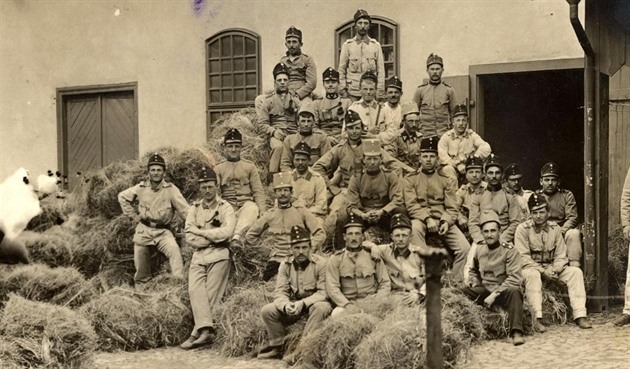It was a great success when, in 1896, a young lieutenant, Josef Rpschl, married the girl Amlia, from nearby Rynka, at the Church of the Nativity of the Virgin Mary in Michli. Gradually, two sons were born to them, and Josef had already risen through the ranks in the army.
The end of the old world idyll, in which the righteous and somewhat exaggerated reign of Frantiek Josef, gives the world its first wolves. The soldier-looking Rpschl, not an officer, who rose to the rank of full colonel, as commander of the 94th pho regiment at Turnov, loved fighting on the Serbian front.
The commander of the Austrian army, Oskar Potiorek, tries to make amends when, as commander of the garrison in Sarajevo, he fails to prevent the assassination of Frantik’s successor Ferdinand d’Este. Bleeding and can’t sleep.
And Rpschl was one of those who paid for it with his life. In the first days, the inexperienced Russian soldiers were able to overcome and defeat the Serbs.
Then there was the Serbian counter-attack, which pushed them back over the Drina border. According to estimates, the battle left 8,000 dead and 30,000 wounded on the Austrian side, about half of them on the Serbian side.
How stable fallThe military history archives have two cards with the names of the dead, blue and green. If you are in all your relationships. Ob comes from the wolf. It has been digitized, contains about 180,000 cards, and each bears the specific name of a fallen, dead or missing soldier of those loyal to Slovakia in the 1920s. The dropped, lost and lost database is created from a kind of card file. Work is progressing slowly, so the estimated 2020 completion will not be achieved and digitization will proceed according to Bal. The database is currently published only up to 1916. The archive processes 1917 and 1918 at the same time. It will be completed after 2020. |
Josef Rpschl is one of them. He died on August 23, 1914, near the town of Abac in Serbia, where he probably didn’t even have a grave. Left in a business circle (bandage) in a monastery in Serbia, for the last military notes.
We don’t, we’re just guessing
Even a hundred years after the end of the Great War, I don’t know how many of them fell or died because of it. Archives of military history began to fall out several years ago. So far, there have only been estimates, which often differ widely.
Let’s start with the card files, which contain the names of Czechs, Slovaks, Maars, Russians, people who should have been born or lived on new Slovak soil in the 1920s, explains the editor of the Military Historical Archives in Prague, Jlis Bal.
According to Bale, around 1.2 million enlisted men and how many died cannot be determined with certainty.
Currently, the archives have 140 and 145 thousand concrete records of deaths, deaths and missing persons. But there are a number of other categories of uninjured people who need to be identified, or who died after the wolves from wounds, he added. He estimates it will be completed after 2020.
The material is digital. This is a list of 244 regiments that were mobilized in the lands of the former Slovakia. Add to them the registers of cavalry, infantry and other units.
According to Bale, the main issue is the nationality of the soldiers. The index cards contain the unit names associated with the Czech and Slovak countries. He had to go find them.
“Many soldiers take you to the infantry or to special units that don’t move with us and are missing from the archives,” explains Bal.
Bloody year 1915
The gradual wall thus slowly shows that the bloodiest year for the echo in the Austrian uniform was the wolf’s second year. According to Bale, about 50,000 of them fell at that time.
In 1915, Czech troops fought in Serbia, but also on the Italian front, where Rakuan repelled the Italian attack. In March 1915, two allies attacked the Czech army from the rear.
Heavy battles with the Russians took place at Halia, in the Carpathians, and the easternmost Austro-Hungarian fortress of Pemyl was fought twice. He surrendered to the Russians on the run, and in May Rakuan with German assistance recaptured it. Noise is also a lot, added Bal.
Dead even after the wolves
and they died even after June 28, 1918, that is, after the collapse of Austria-Hungary. Austrian uniformed soldiers fighting on the Italian front in November. The PM was signed on Nov. 11, notes Bal.
Only the dead are listed in military registers long after the battle has ended. The pinnacle of deaths was the result of injuries, illnesses and trauma brought home from the front. For a long time, they searched for the missing.
Looking for cock
Many of them have not been forgotten by their neighbors. In the military archives, Ron writes questions about archival records.
There is a huge demand for it, 90 percent of questions about service in the first world wolves, fall, legion and the like are on the agenda, explains Bal.
They are not only private individuals, but also museums, cities and municipalities. Especially now, on the 100th anniversary of the end of the war, the memories of the fallen are being restored. Since the 1920s, they have grown in almost every village and their names are often carved into the rock as a single monument.

“Tv nerd. Passionate food specialist. Travel practitioner. Web guru. Hardcore zombieaholic. Unapologetic music fanatic.”







